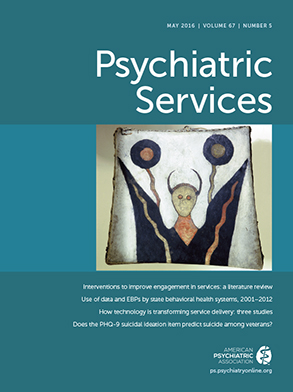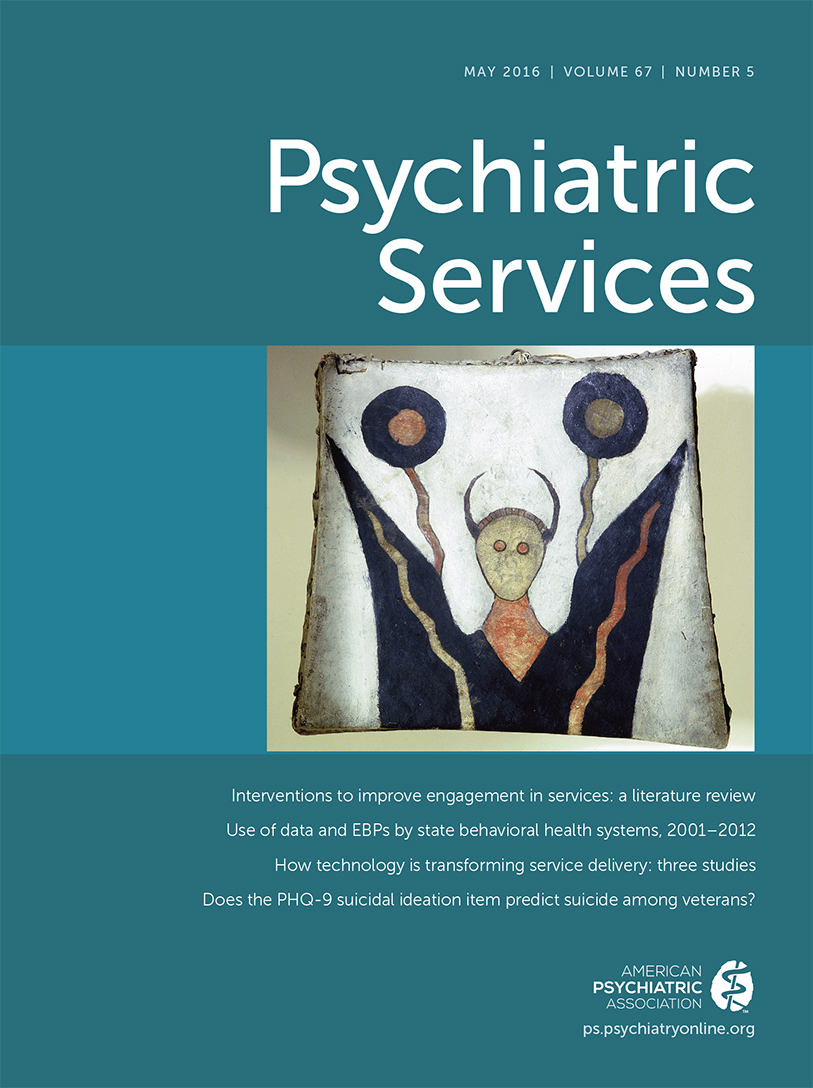Psychiatric mental health nurse practitioners (PMHNPs) are taking on increasing clinical responsibilities when delivering mental health services to individuals with a wide variety of mental illnesses. Specialized master’s-level training programs for psychiatric nurses have been available since the 1950s (
1), and the first nurse practitioner program in the United States was offered at the University of Colorado in 1965 (
2). The number of these programs and their importance has grown, and they provide well-trained clinicians in an ever-changing health care environment. Prescriptive authority was added to PMHNPs’ scope of practice in the 1980s (
3), and all states currently allow PMHNPs to prescribe medications and provide clinical care to patients. PMHNPs work in a variety of settings, such as emergency rooms (
4), hospital consultation and liaison services (
5), outpatient settings (
6), home-based care settings (
7), nursing homes (
8), and psychiatric inpatient units (
9).
Studies have shown that over 75% of U.S. counties have a severe shortage of mental health prescribers, based on county-level estimates of the number of persons with mental illnesses, the number of mental health care providers, and the number of counties with shortages of providers indicating unmet needs for psychiatric services (
10–
12). As psychiatric physician shortages and maldistribution persist in the United States (
13), the role of the PMHNP will continue to expand, and PMHNPs’ training and their ability to collaborate with physicians are becoming increasingly appreciated (
14).
The evolution of PMHNPs’ role in treating patients with mental illness is intricately linked to their ability to act as independent practitioners. PMHNPs’ scope of practice is delineated by nursing boards and by state legislative statutes and rules. Across the 50 states, there are many differing clinical and legislative mandates that PMHNPs must adhere to, depending on the state where they practice.
Over the past 15 years, New Hampshire passed legislation that significantly expanded PMHNPs’ ability to treat patients with serious and persistent mental illness deemed to be a danger to themselves or others. We describe the history of this development and its implications in the treatment of these patients in our state.
Expanding Leadership of PMHNPs in a State Mental Health System
The New Hampshire state mental health system mainly consists of ten community mental health centers (CMHCs) and New Hampshire Hospital (NHH).
CMHCs provide community mental health services to approximately 48,000 individuals annually. These services, including treatment offered to approximately 19,000 individuals deemed severely mentally disabled, are currently being provided by both psychiatrists and PMHNPs. There are 303 psychiatrists and 270 PMHNPs licensed to practice in New Hampshire. Of those, 72 psychiatrists and 49 PMHNPs work in the ten CMHCs and NHH.
NHH is a 158-bed state psychiatric hospital that treats individuals admitted involuntarily because they are a danger to themselves or others as a result of mental illness. NHH admits approximately 2,400 patients a year. NHH inpatient unit treatment teams were historically led by psychiatrists, but over the past decade an increasing number of PMHNPs have taken on roles as treatment team leaders.
An important legislative event occurred in 2001, when New Hampshire established a legal definition of a PMHNP. This New Hampshire statute officially named the PMHNP as an advanced practice registered nurse (APRN) and stated that “an APRN means an advanced practice registered nurse licensed by the board of nursing who is certified as a psychiatric mental health nurse practitioner by a board-recognized national certifying body” (
15). Defining an APRN in a New Hampshire statute was important, because it allowed for future legislation to clearly refer to these well-trained clinicians, preventing confusion for future policy makers. In 2001, the same legislation authorized APRNs to evaluate and sign paperwork in emergency rooms, allowing individuals to be sent to NHH on an initial three-day involuntary emergency admission. Before that, only physicians were allowed to perform this clinical duty.
In 2005, the New Hampshire legislature significantly revised the Nurse Practice Act, stating that APRNs’ scope of practice was “limited to performing acts of advanced assessment, diagnosing, prescribing, selecting, administering and providing therapeutic measures and treatment regimens; obtaining consultation, planning, and implementing collaborative management, referral, or transferring the care of the patient as appropriate; and providing such functions common to a nurse practitioner for which the APRN is educationally prepared and which are consistent with standards established by a national credentialing or certification body recognized by the National Council of State Boards of Nursing and approved by the board in the appropriate APRN role and specialty” (
16). This revision allowed APRNs to be independent practitioners and treat outpatients without physician supervision. At NHH, APRN treatment team leaders continue to work collaboratively and in consultation with a supervising psychiatrist regarding a patient’s overall plan of care.
New Hampshire statute allows individuals to be committed involuntarily to NHH for a maximum of five years. Many patients are committed for much shorter stays and subsequently released on a conditional discharge, wherein they have to abide by certain conditions (such as taking medications as prescribed and keeping all outpatient appointments with their psychiatrist or APRN) when out of the hospital. If they don’t follow these conditions, they can be sent back to NHH through a revocation of their conditional discharge. In 2008, a change in New Hampshire’s Administrative Rules of the General Court authorized APRNs to sign the conditional release papers allowing patients to be released from NHH and also permitted APRNs who are treating patients as outpatients in CMHCs to send patients back to NHH on a revocation of their conditional discharge if a patient was not following his or her agreed-upon treatment plan. Before that rule change, only psychiatrists were able to perform these clinical duties (
17).
Administrative Rules of the General Court of New Hampshire allow for patients committed to NHH involuntarily by a probate court to be treated involuntarily for up to 45 days if, after a petition is written and submitted and a hearing is held, proof is shown by clear and convincing evidence that a psychiatric emergency exists. In 2014, a rule change authorized APRNs to write and submit the petition and testify at such hearings. Before that rule change, only psychiatrists were able to write and submit these petitions and testify at these hearings (
18).
In 2015, legislation authorized APRNs to request long-term psychiatric commitments to NHH for patients for up to five years. Furthermore, if patients had a guardian and the guardian requested that his or her ward be admitted voluntarily to NHH, APRNs were allowed to sign patients into NHH voluntarily with the guardian’s consent. Before that statute change, only psychiatrists were allowed to perform these clinical duties (
19).
These incremental although extremely important statute and rules changes have allowed New Hampshire APRNs increasing opportunities to effectively treat patients with the most severe mental illness. These changes also expanded APRNs’ ability to work in the public sector, allowing an increasing number of prescribers the ability to treat our most vulnerable patient population. APRNs are no longer seen as “mid-level practitioners” or “physician extenders” but as clinician colleagues.
Conclusions
The New Hampshire mental health system has integrated APRNs into clinical leadership roles. Legislative changes have allowed them to demonstrate their ability to direct treatment teams caring for complex, clinically challenging outpatients and involuntarily hospitalized inpatients deemed to be a danger to themselves or others as a result of mental illness. Two factors led to this change: the realization by clinical and administrative leaders in CMHCs and NHH of APRNs’ capacity to take on these responsibilities and the development of a coherent, organized, and proactive legislative strategy by nurses and physician leaders advocating for changes to New Hampshire statutes and rules leading to the incremental expansion of APRNs’ clinical authority. Such success would not have been possible without APRNs’ demonstrating their clinical effectiveness and working closely with physician leaders and policy makers to ease passage of state statutes and rules allowing this to happen. Other states may consider this strategy, thus allowing increasing numbers of prescribers the opportunity to treat vulnerable patient populations.

